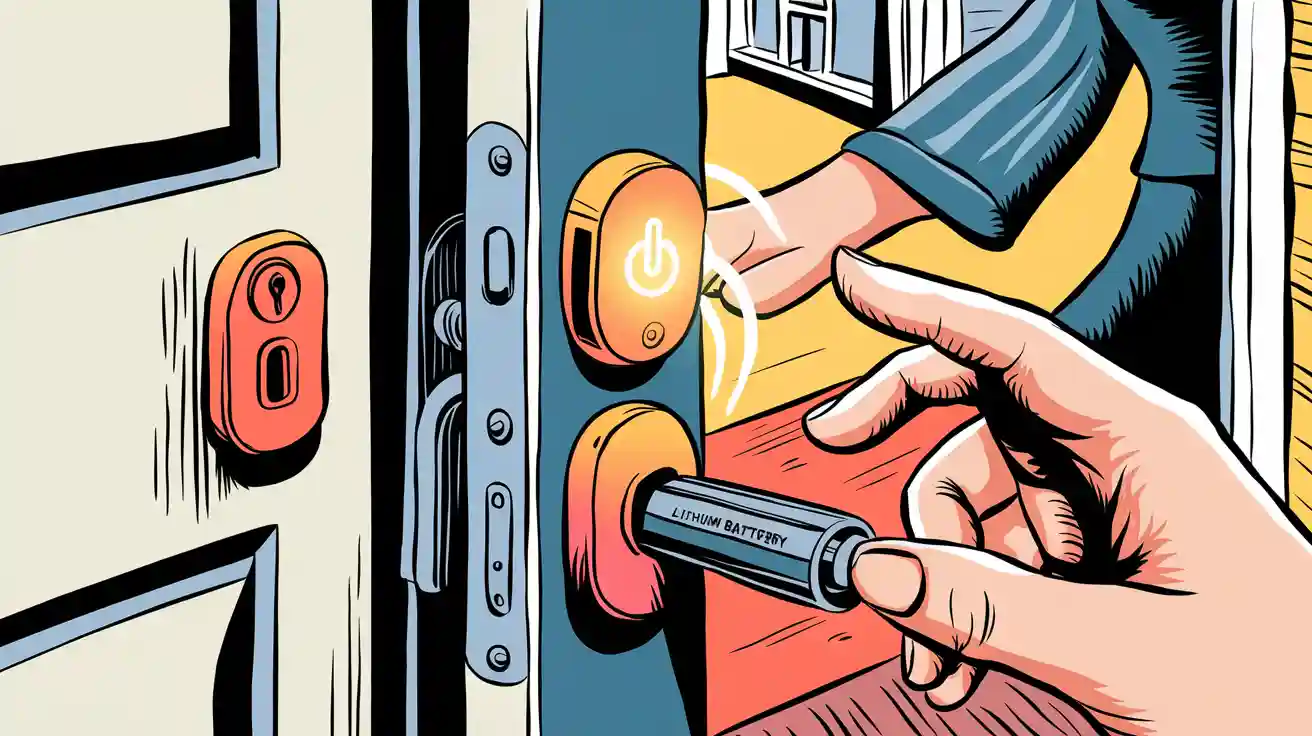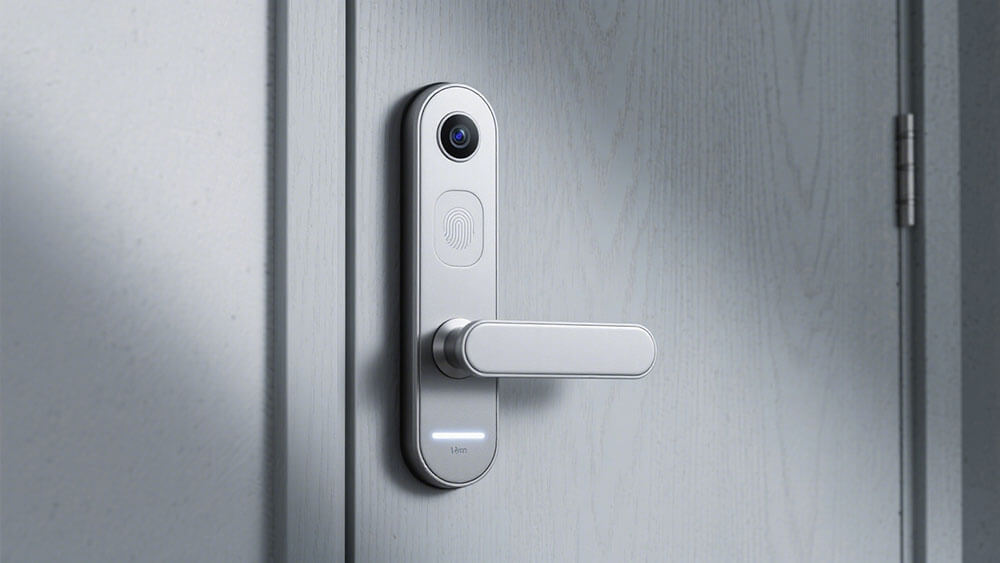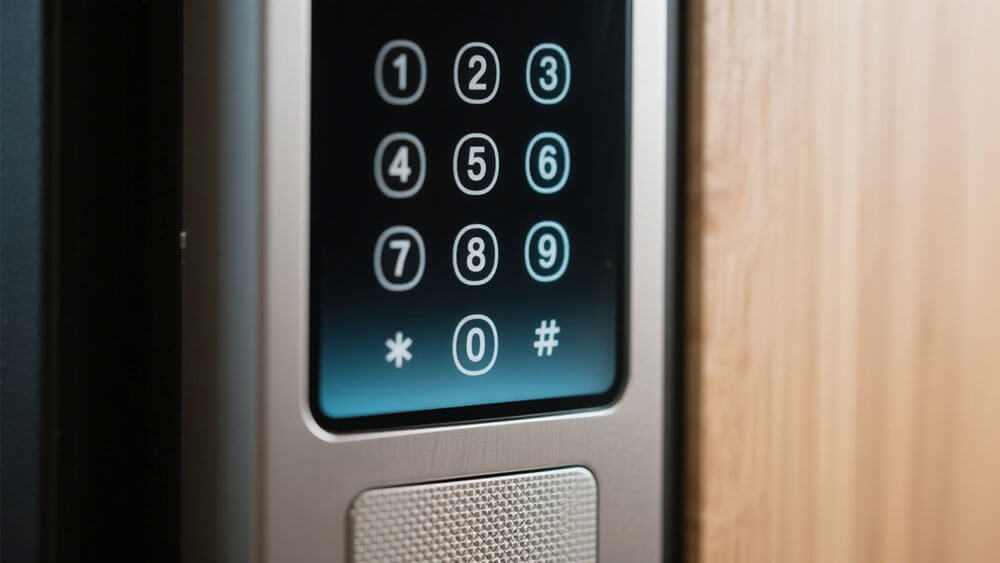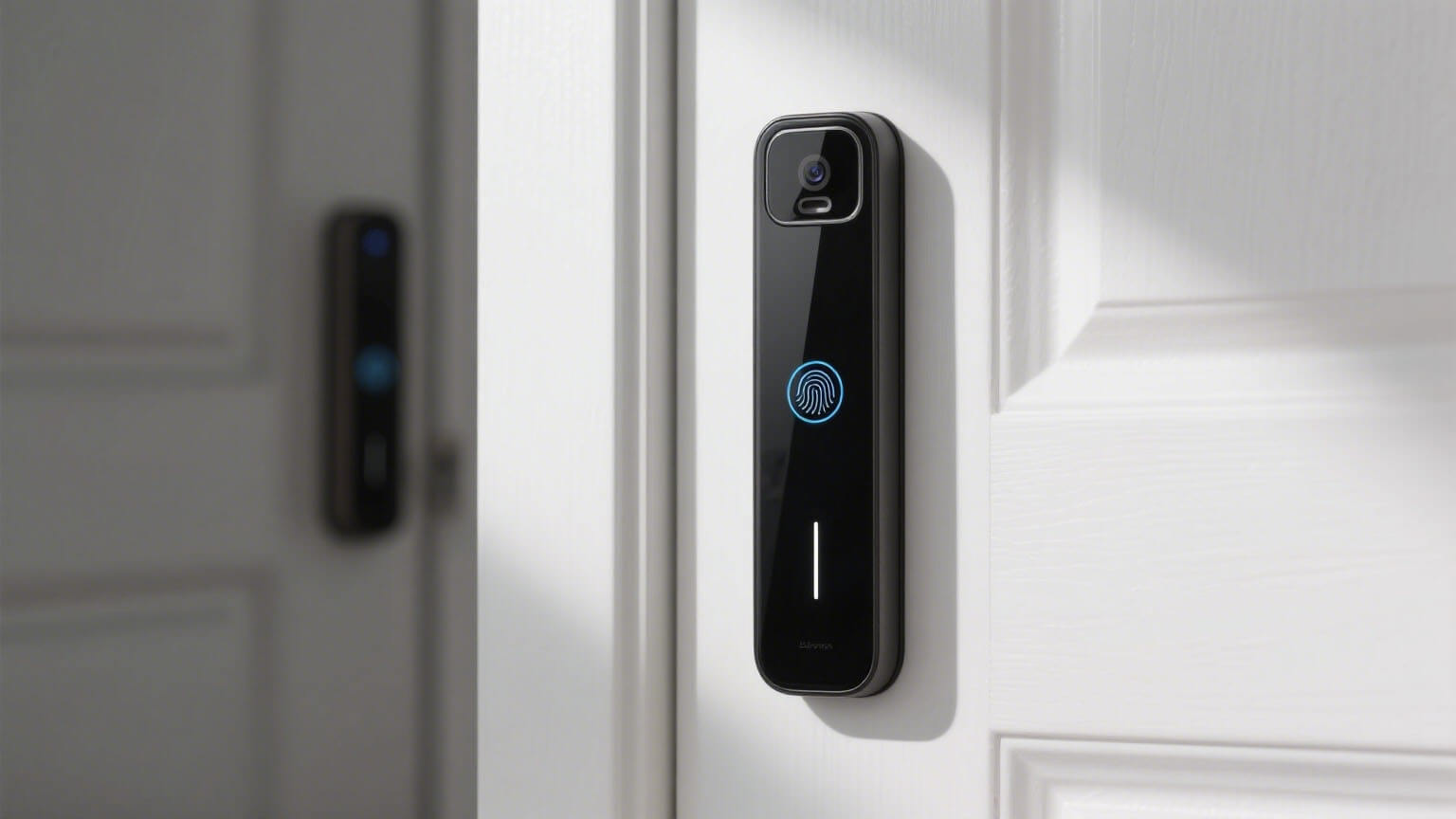
You demand reliable power for every smart door lock, especially those with high-power features like facial recognition and video streaming. The lithium battery of smart door lock delivers consistent performance, supporting keyless entry and advanced electronic door lock functions. Robust battery management systems minimize failure risks, ensuring safe and uninterrupted operation in modern security applications.
Key Takeaways
Lithium batteries provide stable, high-power output that supports advanced smart lock features like facial recognition and video streaming without interruptions.
These batteries maintain steady voltage and perform well in extreme temperatures, ensuring reliable operation and longer battery life compared to traditional options.
Smart lithium battery packs include safety protections and power management systems that extend battery life, prevent failures, and offer real-time status updates for peace of mind.
Part 1: Reliability and Performance

1.1 High Power Output
You need a power source that can handle the demands of modern smart door lock systems. The lithium battery of smart door lock stands out for its ability to deliver continuous high-current output, supporting advanced features such as motorized lock bodies, large screens, and facial recognition modules. When you choose lithium battery packs, you enable your electronic door lock to operate smoothly, even during peak power consumption moments.
Tip: Lithium battery packs provide instant power bursts, ensuring rapid motor startup and eliminating delays during unlocking.
Here is a comparison of battery performance for smart door lock applications:
Feature | Detail |
|---|---|
Voltage Output | Stable 1.5V constant output throughout battery cycle |
Maximum Continuous Current | Supports continuous high-current discharge over 3A |
Battery Type | 1.5V rechargeable lithium-ion batteries |
Energy Capacity | Up to 3300mWh |
Recharge Cycles | 500-1000 recharge cycles (some up to 1200 with USB-C charging) |
Temperature Performance | Operates effectively down to -20°C (-4°F) |
Application | Powers motorized deadbolts, facial recognition, and video streaming |
Advantages | High energy density, long battery life per charge, stable voltage prevents false low-battery warnings |
You can rely on lithium battery packs to power demanding smart door lock features without interruption.
1.2 Stable Voltage
Stable voltage output is critical for the smooth operation of smart door lock systems. Lithium battery packs maintain a steady voltage throughout their discharge cycle, which means you avoid unexpected lock failures and system crashes. Unlike alkaline batteries, which experience a gradual voltage drop, lithium batteries deliver a constant 1.5V output from installation until depletion.
Lithium batteries maintain a steady and consistent voltage output throughout their entire discharge cycle in smart door locks.
You receive reliable power from fresh installation until fully depleted, avoiding the gradual voltage drop seen in alkaline batteries.
Lithium batteries deliver a stable 1.5V output, ensuring smooth motor operation in smart locks.
They perform reliably even in extreme cold temperatures, maintaining voltage better than alkaline batteries which suffer voltage drops and capacity loss.
Their high current capability supports the motor startup demands of smart locks without voltage sag.
Note: Stable voltage output minimizes false low-battery warnings and ensures consistent operation of facial recognition and video streaming features.
Here is a table comparing battery types for smart door lock applications:
Battery Type | Power Output Characteristics | Voltage Stability | Temperature Performance | Lifespan & Reliability |
|---|---|---|---|---|
Lithium Batteries | High current bursts; handles motor startup demands | Stable voltage throughout | Reliable down to -40°F | 3-5 times longer battery life than alkaline; low self-discharge |
Alkaline Batteries | Voltage drops under load; struggles with motor power | Voltage declines as used | Capacity loss below 32°F; may fail below 0°F | Shorter battery life; frequent replacements; risk of leakage |
Nickel-based (NiMH) | High capacity; rechargeable but nominal voltage 1.2V | Lower nominal voltage (1.2V) | Performs well but may not suit 1.5V optimized locks | Sustainable with many recharge cycles; may cause false low-battery warnings |
You benefit from the superior voltage stability of lithium battery packs, which supports the uninterrupted operation of your smart door lock system.
1.3 Extreme Temperature Adaptability
Smart door locks often operate in challenging environments, including extreme cold and heat. The lithium battery of smart door lock excels in temperature adaptability, maintaining high battery life and reliable performance across a wide range of conditions.
LiFePO4 Lithium battery and NMC Lithium battery cells retain up to 90% of their capacity at -20°C, ensuring your smart door lock functions even in harsh winter climates.
Lithium batteries operate reliably from -40°F to 140°F (-40°C to 60°C), making them ideal for exterior door locks exposed to temperature extremes.
Ultra-low self-discharge rate allows lithium batteries to maintain charge over long periods, reducing maintenance and replacement frequency.
Leak-proof design protects sensitive lock electronics from damage caused by heat-induced leakage in other battery types.
Stable voltage and high current output ensure reliable motor function under temperature stress.
Callout: For B2B clients in security, infrastructure, and industrial sectors, lithium battery packs provide the durability and adaptability needed for smart door lock systems deployed in diverse environments.
If you want to learn more about sustainable battery solutions, visit Our Approach to Sustainability.
Part 2: User Experience and Safety

2.1 Long Battery Life
You expect your smart door lock to deliver consistent performance with minimal interruptions. Lithium battery packs excel in providing extended battery life, even when powering advanced features like facial recognition, video streaming, and Wi-Fi connectivity. The high energy density of lithium batteries ensures that your smart door lock operates reliably for months before requiring a recharge or replacement.
Here is a comparison of average battery life across different smart door lock types:
Smart Lock Type | Average Battery Life (months) | Notes on Usage and Factors Affecting Life |
|---|---|---|
Basic Keypad Locks | 24 – 36 | Lithium batteries last 2-3 years under typical usage |
Bluetooth Smart Locks | 18 – 24 | Battery life influenced by connectivity and usage frequency |
Wi-Fi Connected Locks | 12 – 18 | Higher power consumption reduces battery life |
Full-Featured Smart Locks | 8 – 12 | Includes biometric and multiple connectivity features |
Weiser Smart Lock | 2 – 6 | Varies widely with usage, can be as low as 2 months |
Samsung Smart Lock | 6 – 12 | Dependent on battery type, usage, and environmental conditions |
You notice that full-featured smart door locks, which integrate multiple high-power modules, still achieve up to a year of battery life with lithium battery packs. Factors such as temperature, frequency of use, and connectivity type (Wi-Fi or Bluetooth) can impact battery life, but lithium batteries consistently outperform traditional options in demanding scenarios.
Tip: For high-traffic entrances or commercial settings, you can further optimize battery life by selecting LiFePO4 Lithium battery packs, known for their long cycle life and stable performance in extreme temperatures.
2.2 Smart Power Management
You benefit from advanced smart power management features built into lithium battery packs for smart door locks. These features not only extend battery life but also enhance your control and visibility over the lock’s power status.
Smart Battery Management System (BMS) continuously monitors voltage, current, and temperature, preventing overheating and maximizing battery life. Learn more about BMS operation and components
Cell balancing technology ensures each cell in the battery pack charges and discharges evenly, which improves overall battery lifespan and reliability.
Cloud-enabled BMS platforms allow you to track battery status remotely, including charging, discharging, and idle states.
Real-time notifications and fault diagnosis alerts appear on your app, enabling timely maintenance and preventing unexpected lockouts.
Fast charging options, such as USB-Type C, reduce downtime and provide flexibility for emergency recharging.
Local alerts, including buzzer and LED indicators, give you immediate feedback on battery status at the door.
You gain peace of mind knowing your smart door lock will notify you well in advance of low battery conditions. The integration of predictive maintenance, OTA firmware updates, and adaptive charge management further ensures that your lock remains secure and operational with minimal manual intervention.
Note: Smart power management features are especially valuable for B2B clients managing multiple access points across infrastructure, security, or industrial facilities. Explore custom battery solutions for your application
2.3 Safety Protections
You require the highest level of safety for your smart door lock, especially when it protects critical assets or sensitive areas. Lithium battery packs incorporate multiple layers of built-in safety protections to prevent failures and ensure safe operation.
Overcharge, overdischarge, overcurrent, and temperature protections are standard in lithium battery packs, automatically cutting off charging or discharging when thresholds are exceeded.
Internal cell safety devices, such as PTC (positive temperature coefficient) components and Circuit Interrupt Devices (CID), inhibit high current surges and open the circuit if internal pressure rises.
Safety vents allow controlled gas release, preventing cell rupture and reducing the risk of catastrophic failure.
Leak-proof design eliminates the risk of electrolyte leakage, which can damage sensitive electronics in your smart door lock.
External electronic protection circuits provide an additional layer of defense against short circuits and faulty chargers.
Automotive-grade thermal management and humidity sensors maintain optimal operating conditions, even in harsh environments.
Callout: While no battery system is entirely immune to rare internal defects, you can significantly reduce risk by choosing lithium battery packs from reputable manufacturers with rigorous quality control. Proper operation and regular maintenance further enhance safety and reliability.
You can trust that lithium battery-powered smart door locks meet stringent safety standards, making them suitable for security, infrastructure, and industrial applications. Learn more about our approach to sustainability and safety.
Part 3: Design and Environmental Benefits of Lithium Battery of Smart Door Lock

3.1 Flexible Shape and Lightweight
You gain significant design flexibility when you choose lithium battery packs for your smart door lock. Manufacturers often select the 18650 lithium-ion battery for its compact cylindrical shape and high energy density, which fits seamlessly into slim lock bodies. Lithium polymer batteries offer even greater customization, allowing you to match the battery’s shape to the internal contours of your device. This approach maximizes space and reduces overall weight, supporting sleek, modern lock designs.
18650 lithium-ion batteries provide 2000–3500mAh at 3.7V, supporting long-term operation.
Lithium polymer batteries enable custom pouch shapes for irregular or compact lock housings.
Custom battery packs can include integrated safety features and charge indicators without adding bulk.
Tip: Flexible battery design helps you optimize space, reduce weight, and enhance the user experience in every smart door lock.
3.2 Eco-Friendly and Cost-Effective
You support sustainability by choosing rechargeable lithium batteries for your smart door lock. These batteries last 3–5 times longer than alkaline options, reducing waste and replacement frequency. Their stable voltage and performance in extreme temperatures minimize premature disposal. Rechargeable lithium batteries can be cycled up to 1200 times, keeping hundreds of disposable batteries out of landfills.
Feature | Lithium Batteries | Alkaline Batteries |
|---|---|---|
Recycling Rate | 65% (EU 2023) | <10% (EPA 2022) |
Mercury Content | None | 0.025% |
Lifespan | 3x longer | Standard |
Leakage Risk | 5x lower | Higher |
Self-Discharge Rate | 2%/month | 5%/month |
Temperature Performance | -40°F to 140°F | Less effective in extremes |

For more on sustainable battery solutions, visit Our Approach to Sustainability.
3.3 Comparison with Traditional Batteries
You benefit from the superior reliability and cost-effectiveness of the lithium battery of smart door lock compared to traditional options. Lithium batteries deliver longer life, stable voltage, and better storage reliability, which is essential for uninterrupted smart door lock operation.
Battery Type | Characteristics | Typical Battery Life in Smart Locks |
|---|---|---|
Alkaline Batteries | Disposable, AA/AAA size | 3–8 months |
Lithium Batteries | Rechargeable, leak-proof, long-lasting | 8–36 months |
NiMH Batteries | Rechargeable, moderate voltage | 6–18 months |
You reduce maintenance costs and improve reliability by selecting lithium batteries. This choice ensures your smart door lock remains operational, even in demanding environments.
You gain a clear advantage by choosing lithium battery packs for your smart door lock.
Enjoy stable voltage, long lifespan, and reliable operation in extreme climates.
Benefit from lightweight, leak-proof design and eco-friendly rechargeability.
Support next-generation security and efficiency.
FAQ
1. How does a lithium battery pack improve smart door lock reliability for B2B applications?
You gain stable voltage, high current output, and extended cycle life. These features ensure your smart door lock operates reliably in security, infrastructure, and industrial settings.
2. What are the main differences between lithium battery packs and alkaline batteries in smart door locks?
Feature | Lithium Battery Pack | Alkaline Battery |
|---|---|---|
Voltage Stability | High | Low |
Cycle Life | 500–2000 cycles | Single-use |
Leakage Risk | Minimal | Higher |
Tip: Lithium battery packs reduce maintenance and replacement costs for your business.
3. Can you customize lithium battery packs for unique smart door lock designs?
Yes. You can request custom shapes, capacities, and BMS features. Large Power provides tailored battery solutions for your specific project requirements.




